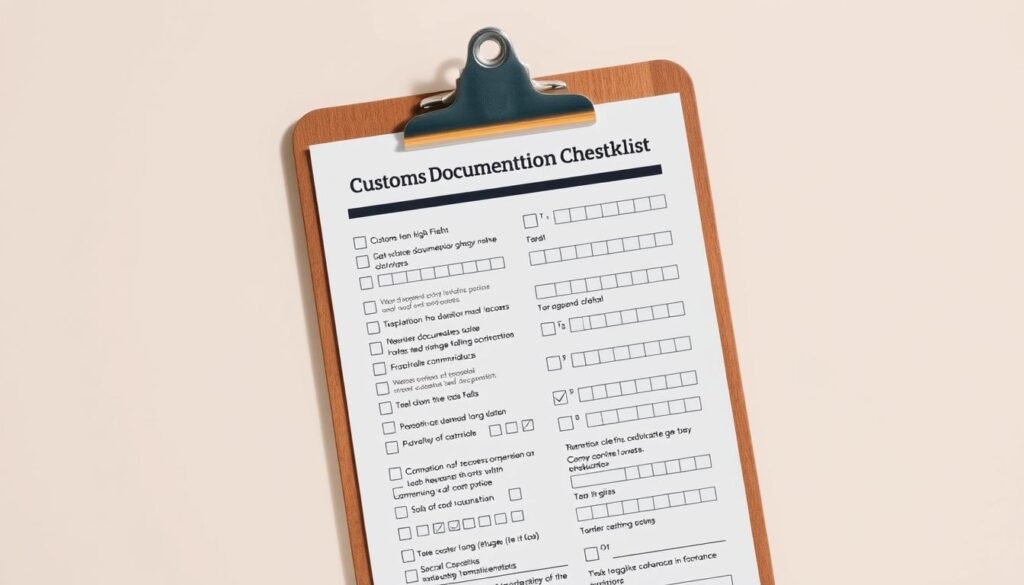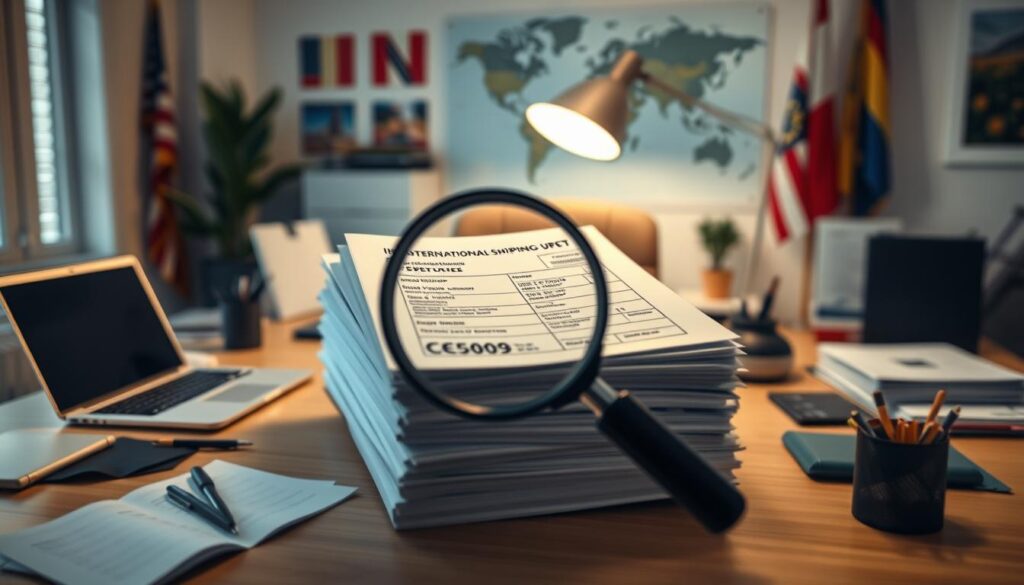Ever wondered why your international package seems to vanish into thin air? Navigating the customs clearance process can feel like solving a complex puzzle. What secrets do customs officials know that could be keeping your shipment in limbo?
I’ve spent years helping people understand import regulations and tackle customs challenges. When packages get held at destination, it’s not just frustrating—it can be a real headache for international shoppers and sellers alike.
The customs hold at destination is more than just a waiting game. It’s a critical checkpoint where officials verify documentation, assess duties, and ensure compliance with international shipping regulations. Understanding this process can transform your shipping experience from stressful to smooth.
Key Takeaways
- 25% of international shipments face customs delays
- Proper documentation resolves 70% of customs holds within 3 days
- Customs clearance can take 1-14 days depending on the shipment
- Proactive communication resolves 80% of shipping delays
- Electronic documentation can significantly reduce hold times
Understanding Customs Hold and Why It Happens
International shipping can be tricky. Sometimes, your package gets stuck in customs. Knowing why this happens helps make shipping smoother.
Customs holds are more common than you think. DHL says 80% of customs delays come from wrong or missing documents. So, most delays can be avoided with good preparation.
Common Reasons for Package Detention
- Incomplete or inaccurate customs declaration
- Outstanding taxes and fees
- Shipping prohibited or restricted items
- Suspicious package contents
Import Regulations and Restricted Items
Every country has its own rules for imports. Some items are very controlled or banned. Knowing these rules helps avoid customs problems.
| Item Category | Potential Customs Action |
|---|---|
| Agricultural Products | Strict Inspection |
| Electronics | Detailed Documentation Required |
| Pharmaceutical Products | Government Agency Clearance |
| Hazardous Materials | Potential Seizure |
Preventing Customs Delays
To avoid customs delays, I suggest:
- Double-check all shipping documents
- Learn about import rules of the country you’re sending to
- Be honest about what’s in the package
- Use clear, detailed descriptions on customs forms
By knowing about customs holds, you can lower the chance of delays or seizures for your shipments.
How to Check the Status of My Package
Tracking a package in customs can be tricky. Knowing how customs works helps. It makes you feel better and understand where your package is.
When your package is in customs, tracking is key. The right steps help you know when it will be released. They also help you manage your documents.
Using Tracking Numbers
Tracking numbers are your main tool. Here’s how to use them:
- Put the tracking number on the carrier’s website
- Check on different sites (carrier and customs)
- Look for updates about customs
Contacting Shipping Carriers
Talking to carriers can give you more info. Be ready with:
- The full tracking number
- The shipment date
- Where it started and where it’s going
Carriers have teams for customs. They can tell you why your package is held.
Understanding Information from Customs
Customs messages need careful reading. They usually say:
| Status Indicator | Potential Meaning |
|---|---|
| Initial Inspection | It’s just being checked |
| Additional Review Required | They need to check your papers |
| Duty/Tax Pending | You need to pay for it to be released |
Pro tip: 80% of customs delays are because of wrong documents. Always check your papers twice.
Knowing these steps makes customs easier. It helps avoid shipping problems.
What Documents Might I Need?
Shipping internationally can be like solving a puzzle. You need the right papers for a smooth process. Knowing the rules is key.

- Customs Declaration Form
- Commercial Invoice
- Detailed Packing List
- Certificate of Origin
- Product Specific Certificates
Critical Customs Documentation
Each document is important for customs. They need the right info to check duties and contents.
| Document Type | Purpose | Required Details |
|---|---|---|
| Customs Declaration Form | Declare shipment contents | Item description, value, quantity |
| Commercial Invoice | Prove transaction value | Seller/buyer details, pricing |
| Certificate of Origin | Verify product manufacturing location | Country of production |
Pro Tips for Documentation
Keep multiple copies of each document. Customs might need three copies. Digital backups help too.
Pro tip: Use a “documents enclosed” pouch. It keeps paperwork safe and easy to find for customs.
Tips for Communicating with Customs
Talking to customs can be tough. But, if you communicate well, it can make things easier. Knowing how to talk to customs can help your package move faster.
Preparing Your Queries
Before you ask about your package, get ready. Collect all important papers first. Your questions should include:
- Tracking number
- Shipment details
- Specific item descriptions
- Commercial invoice
- Accurate product value
Using Clear and Concise Language
Customs gets a lot of questions. Be clear. Give straight answers without extra words. Just the facts about your package.
Following Up on Your Request
If you don’t hear back, don’t give up. Ask again in a polite way. Keep all your messages safe and be ready to share more info if needed.
Pro Tip: Being patient and polite can really help you get through customs faster.
Resolving Issues with Customs
Dealing with customs can be hard. But knowing what to do can help you fix problems fast. Customs holds can mess up your shipping. But, you can get past these problems with the right steps.
When you face customs problems, knowing a lot helps. I’ll show you how to deal with disputed charges. And when you need customs broker services.
Steps to Take for Disputed Charges
Disputed charges often come from missing documents or confusion. Here’s what to do:
- Gather all original shipping documents
- Check if product classifications and values are right
- Write clear explanations for any differences
- Collect proof like receipts and invoices
How to Appeal Customs Decisions
Appealing customs decisions needs a smart plan. You must give clear, detailed info to get released. Follow these steps:
- Find out why you’re held up
- Send more documents quickly
- Talk directly to customs officials
- Ask for a formal review if needed
When to Consult a Customs Broker
Customs broker services are very helpful in tough cases. If paying duties and taxes is too much, or you’re lost in rules, a broker can help. They make things easier.
Using a customs broker can cut clearance times by about 50% for tricky shipments.
A good customs broker knows all about shipping rules. They can fix problems fast. This saves you time and money.
Understanding Customs Fees and Charges
International shipping can seem very complex. Duty and tax payments are key parts of the customs process. Knowing these costs helps you plan better and avoid surprises.

When you ship items across borders, you’ll face different fees. Here are the main costs you might see:
- Import duties based on merchandise value
- Taxes specific to imported goods
- Processing and handling fees
- Potential inspection charges
Breakdown of Possible Costs
Customs duties use the Harmonized Tariff Schedule of the United States. The rate depends on the item’s value, not its quality or weight. For example, returning residents get an $800 duty-free exemption every 31 days.
“Know your exemptions and possible charges before shipping internationally to avoid financial surprises.”
How to Pay Customs Fees
Paying customs fees needs careful planning. You can pay with:
- U.S. currency
- Personal checks
- Credit cards (in some places)
How to Avoid Unexpected Costs
To avoid extra costs, follow these tips:
- Accurately declare all items
- Know the current duty rates
- Keep detailed shipping records
- Ask a customs broker if you need help
Being prepared can save you time, money, and stress with international shipping customs.
How to Avoid Future Customs Holds
International shipping can be tough. But, with the right steps, you can avoid customs holds. Knowing import rules and keeping good records are key to fast delivery.
- Prepare detailed and correct shipment documentation
- Look up specific import regulations for each country
- Fill out customs forms carefully and fully
- Securely pack items and label them right
Best Practices for International Shipping
When shipping abroad, pay close attention to details. Customs gets busier during peak times. So, being ready ahead of time is key. Mistakes in paperwork can lead to big delays.
| Documentation Requirement | Purpose |
|---|---|
| Commercial Invoice | Detailed product description and value |
| Packing List | Itemized contents of shipment |
| Bill of Lading | Shipping contract and goods receipt |
Understanding Customs Regulations
Every country has its own rules for imports. It’s smart to check what your country needs. Use online tools and tracking to stay ahead of customs issues.
Keeping Up with Package Documentation
It’s important to keep all your shipping records in order. Have copies ready for audits. Also, think about using a customs broker to help with rules and speed up delivery.
When to Seek Professional Help
International shipping can be hard to understand. Sometimes, you need help to get your packages through customs. Customs broker services can really help with this.
International shipping has many problems. Packages can get stuck for many reasons. This is when you really need a customs broker.
Benefits of Hiring a Customs Broker
Customs brokers offer big benefits:
- They know how to deal with complex customs rules.
- They help avoid delays in shipping.
- They make sure all documents are correct.
- They can save you money by avoiding fines.
Finding the Right Logistics Company
When picking a customs broker, look at these things:
| Selection Criteria | What to Look For |
|---|---|
| Experience | They should have a good track record in shipping. |
| Expertise | They should know a lot about your shipping needs. |
| Technology | They should have the latest tracking and communication tools. |
Resources for Customs Assistance
Here are some places to get help:
- Government customs websites
- International trade associations
- Professional logistics networks
Pro tip: Don’t wait until you’re in trouble to ask for help. Getting help early can save you time, money, and stress.
Staying Informed About Customs Policies
International shipping is complex. Knowing import rules is key. Keeping up with customs can avoid shipping problems.
Government sites like the U.S. Customs and Border Protection (CBP) are great resources. They have the latest on shipping rules. The Automated Commercial Environment (ACE) is a tool for tracking imports and exports.
Online forums and shipping groups are also helpful. They share tips on dealing with customs. These groups offer real advice that helps a lot.
Learning about shipping is important. About 20% of shipments face delays. Knowing the rules can help avoid these problems. Knowledge is your best tool for global shipping.
